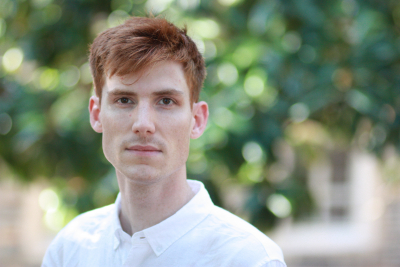Simon Torracinta, 2022-23 HOPE Center Visiting Scholar

Economists today normally do not concern themselves with wants, with why people spend money on this rather than that or why they engage in one behavior over another.
But as Simon Torracinta, a 2022-23 HOPE Center visiting scholar, points out, there was a time when economists were very much involved in discussions about why people want what they do—discussions not only among themselves but also with psychologists and other social scientists.
“Toward the end of the nineteenth and beginning of the twentieth centuries, economists were heavily engaged in an interdisciplinary and open dialogue about human desires and wants,” Simon explains.
A PhD candidate at Yale, Simon is writing a dissertation about the fundamental transformation in the conceptualization and scientific investigation of human wants and desires in the early twentieth century.
Up until around 1900, he says, economists and psychologists subscribed to a richer account of human motivation, talking of such things as satiation and pleasure.
“These older accounts of desire were more spiritual and introspective, but, for better or worse, they gave way in the 1910s and 1920s to what I think of as behavioristic approaches to the understanding of motivation,” Simon explains.
In short, economists and psychologists decided to shun what they could not observe—the internal emotional and mental conflicts and considerations that are behind many of the decisions people make—and accept as legitimate only those things that they could measure.
For economists, that meant relying on prices to determine what people want and value.
“It was all part of a push to become more scientific,” Simon explains.
But, he adds, there was a political dimension as well.
“This was at a time when many people were giving serious consideration to socialism as a viable economic system. A focus on prices allowed economists to argue against such things as central planning.”
At Yale, Simon is in the Program in the History of Science and Medicine. His dissertation advisor has encouraged him to look at what went unsaid as economists and psychologists turned from introspective evidence to observable phenomena such as prices and grocery bills.
“What was the utility, so to speak, of having a narrow account of human motivation?”
While at Duke, Simon plans to consult several collections in the Economists’ Papers Archive, housed in the Rubenstein Library. Among them are the papers of Tibor Scitovsky, the Hungarian-born US economist who published such works as The Joyless Economy: An Inquiry into Human Satisfaction and Consumer Dissatisfaction.
After two-plus years of the pandemic, Simon is grateful to connect again with a community of colleagues interested in similar topics.
“Plus it’s been great talking with people who have a wider knowledge of how economics evolved over the past hundred years, who can comment on my work in the context of where economics has gone since the early years of the twentieth century.”
Simon plans to finish his dissertation and enter the job market this spring.